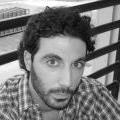Creative Writing Series (Baghdad, Iraq)
Series Description
Students and scholars in Baghdad, Iraq, will gather for a multi-genre series of lessons, discussions, and workshops in creative writing.
Series Schedule
September 19th: American Literature with Christopher Merrill
October 11th: Introduction to Poetry with Blueberry Morningsnow
November 19th: Advanced Poetry with Daniel Khalastchi
December: Playwriting with Sean Lewis
January 21st: Introduction to Fiction with Mark Mayer
March 26th: Advanced Fiction with Hugh Ferrer
April 29th: Comparative Literature with Hugh Ferrer
Instructors

Christopher Merrill has published seven collections of poetry, including Watch Fire, for which he received the Lavan Younger Poets Award from the Academy of American Poets; many edited volumes and translations; and six books of nonfiction, among them, Only the Nails Remain: Scenes from the Balkan Wars, Things of the Hidden God: Journey to the Holy Mountain, The Tree of the Doves: Ceremony, Expedition, War, and Self-Portrait with Dogwood. His writings have been translated into nearly forty languages; his journalism appears widely; his honors include a Chevalier des Arts et des Lettres from the French government, numerous translation awards, and fellowships from the John Simon Guggenheim Memorial and Ingram Merrill Foundations. As director of the International Writing Program at the University of Iowa since 2000, Merrill has conducted cultural diplomacy missions to more than fifty countries. He served on the U.S. National Commission for UNESCO from 2011-2018, and in April 2012 President Barack Obama appointed him to the National Council on the Humanities. www.christophermerrillbooks.com

Blueberry MORNINGSNOW, an Alberta Metcalf-Kelly fellow, earned her MFA in poetry from the Iowa Writers' Workshop in 2008 and has taught college composition and creative writing for the past five years in Iowa at various institutions. In 2011, her first book of poems, Whale in the Woods, won the Black Poetry Prize from Rescue Press.

Daniel KHALASTCHI is a first-generation Iraqi American from Iowa. He received his MFA in Poetry from the Iowa Writers’ Workshop and was awarded a writing fellowship at the Fine Arts Work Center in Provincetown in 2006. Khalastchi currently serves as the Assistant Director of the Undergraduate Certificate in Writing Program at the University of Iowa and as a founder and co-editor of Rescue Press. His first book of poems, Manoleria, was published in 2011 after winning the Tupelo Press/Crazyhorse First Book Prize.

Sean LEWIS is a graduate of the University of Iowa’s MFA Program in Playwriting and a founding member of Working Group Theatre, an Iowa City arts organization that produces plays and educational programming. He is the recipient of the National New Play Network’s Smith Prize for Drama, the Kennedy Center's Rosa Parks Award, and the William Inge Fellowship, among others.

Mark MAYER is the Robert P. Dana Emerging Writer Fellow at Cornell College. A former Teaching-Writing Fellow at the Iowa Writers’ Workshop, he is winner of the John Leggett Fiction Prize and the Donald Justice Poetry Prize. His fiction has been nominated for Pushcart Prizes and anthologized in New Stories from the Midwest.

Hugh Ferrer, on staff since 2001, serves as a Senior Editor of the Iowa Review, and on the boards of Iowa City’s UNESCO City of Literature and the University of Iowa’s Center for Human Rights. For many years, he has been on faculty at the Iowa Summer Writing Festival; and the UI courses he has taught have introduced undergraduates to fiction writing, international literature, journal publishing, and Iowa City’s literary culture.
Maori & Tauiwi Literature Lecture (Wellington, New Zealand)
Lecture Description
This one-time presentation, entitled "From Baxter to Blogs: A View of Contemporary Māori and Tauiwi Literature in Aotearoa and New Zealand," will link University of Iowa undergraduates enrolled in the first year honors seminar “Learning about the Social World from Fiction” and New Zealand-based poet and musician Hinemoana Baker. Baker’s lecture will provide a chronological sampling of major Māori poetry and fiction and conclude with a short performance of Baker’s own work followed by a brief Q&A session.
Instructor

Hinemoana BAKER is a New Zealand-based poet and musician. She published her first book of poems Matuhi | Needle in 2004 and attended the International Writing Program as a fall resident in 2010.
Creative Nonfiction: Immigration Syllabus
Course Description
International Issues in Creative Nonfiction: Immigration
Spring 2012, January 16-May 13
Welcome to Independent Studies: IWP Creative Writing: International Issues in Creative Nonfiction: Immigration offered by the International Writing Program and funded through the US State Department. This course will link students in Iowa City, USA and Tijuana, Mexico who are interested in creative nonfiction, a mode of pushing and redefining literary boundaries—between the subjective and objective, the domestic and global, the personal and political, the fictional and the factual. This exchange will be facilitated by co-instructors in both countries for nonfiction writers who are excited about communicating via social media and technology, and who enjoy working with international peers to examine one of the most pressing social and political issues our world faces today: immigration. Over the next sixteen weeks, we will read extraordinary works of creative nonfiction addressing this topic and then strive to write our own. All work will center on the idea of reading as a writer and generating creative work in response. In other words, this will be as much of a literature course as it is a creative writing course.
Students will be graded on participation in discussions, whether work is turned in on time, and whether an appropriate amount of effort has been invested. Two video conferences will take place over the duration of the course via Elluminate. At the end of the semester creative work will be collected into a podcast anthology or e-book. All course activities will be conducted in English.
Instructors

Originally from south Texas, Stephanie ELIZONDO GRIEST is the author of the memoirs Around the Bloc: My Life in Moscow, Beijing, and Havana and Mexican Enough: My Life Between the Borderlines as well as the guidebook 100 Places Every Woman Should Go. She has written for The Believer, Oxford American, New York Times, and Washington Post, and edited the anthology Best Women’s Travel Writing 2010. The winner of a Margolis Award for Social Justice Reporting, she has been a Henry Luce Scholar in China, a Hodder Fellow at Princeton, and currently teaches Creative Nonfiction at UNC-Chapel Hill.

Mariana Martinez Estens (Tijuana, Mexico) is a Mexican journalist and poet based in the Tijuana/San Diego border region as well as a professor for the Border Issues Seminar at the Universidad Iberoamericana in Tijuana. Martinez Estens has been honored with the Henry Taylor Award and a Cabot International Journalism Scholarship, among other awards. She is the author of three books of poetry. Martinez Estens is an honors graduate of Columbia’s Graduate School of Journalism and has a B.A. in communications from the Universidad Iberoamericana in Tijuana and a degree in English/Spanish translation and interpretation from the University of California, San Diego.
Course Materials
As this is a web-based class, students will need a high-speed internet connection for reliable connection and video chat sessions. Further, students must have access to a webcam and microphone to take part in video chat sessions. The following texts are required, and may be purchased via Amazon, the University of Iowa Bookstore, or any other venue. All books are available in electronic format as well.
Luis Alberto Urrea, Devil’s Highway
Suketu Mehta, Maximum City
Maxine Hong Kingston, The Woman Warrior
Dave Eggers, What is the What
Course Interaction
Our primary means of interaction will be University of Iowa’s ICON system—a secure, online educational environment. On our course homepage, you will find all the materials you need for class—extra readings, course documents, assignment guidelines, and so on. Another integral feature of this class will be the forums, also hosted through ICON, which will be the main site of our conversations as a group. Here, we’ll post both our workshop contributions and our weekly written responses. In addition we’ll be using a real-time video chat feature hosted through UI called Elluminate. We’ll use this twice throughout the semester to discuss workshop pieces. More info on when and how this will happen is forthcoming….
Assignments
Assignments will include:
1) Academic responses to discussion questions;
2) Creative responses to prompts;
3) Workshop pieces of creative nonfiction (including memoirs, personal essays, or literary journalism);
4) Responses to classmates for workshop.
Academic Responses
For each of the four books we read as a class, the instructors will post probing discussion questions on ICON. Students must write an original response of 350-400 thoughtful, well-reasoned words to one of the questions, as well as a brief 100 word response to one of their classmate’s responses. These must be completed by Monday of the week following the posting.
Creative Responses
On ICON, you will find a series of handouts filed under the “Writer’s Toolkit” folder that give strong examples of the following elements of craft: description, character, setting, dialogue, point of view, voice, stellar sentences, and revision. Four times throughout the semester, you will be asked to take a little excursion and then write a 350-400 word mini-essay about that experience, employing a particular element of craft. Ideally, you’ll be able to fuse these mini-essays into your workshop essay. Creative responses must also be posted to the ICON forums by Monday of the week following the posting.
Workshop Pieces
Twice during the semester, each student will compose a 5-6 page memoir, personal essay, or journalistic narrative and post them on ICON for class critique. Each piece must be “complete” in that it must have a beginning, middle, and end, and final draft quality, meaning no grammatical errors, misspellings, and so on. Students are encouraged to use their creative responses as launching points for these pieces.
Workshop Responses
Every student will respond to each workshop contribution via a letter of critique within a week of the story’s submission. These critiques should focus on elements of craft—style, character, voice, dialogue, and so on—and should provide insightful, detailed, and specific criticism on how to improve the piece. All responses should be polite, considerate, and constructive. Any student who routinely violates this policy may face a grade reduction.
Grading
For undergraduates taking this course for credit, your final letter grade will be largely determined by how extensively you participate in discussions, both via the forums and the video chat, and the quality of your feedback. Lateness of an assignment will also adversely impact your final grade. Do your work, do it well, and you’ll be fine.
For those of you enrolled as auditors or as non-credit students: your essays will only be workshopped if you generously participate in the forums.
Students with Disabilities
Instructors will make reasonable accommodations for students with physical, mental or learning disabilities. At the University of Iowa, students with disabilities requiring some modification of seating, testing, or other class requirements should visit with Stephanie Elizondo Griest so that appropriate arrangements may be made. Contact Student Disability Services, 3100 Burge Hall (335-1462), to obtain a Student Academic Accommodation Request form (SAAR), which specifies what course accommodations are judged reasonable for a given student.
Academic Fraud
You are expected to be honest and honorable in your fulfillment of assignments. Academic fraud is a serious form of misconduct. A full explanation is given in the Student Academic Handbook.
An instructor who suspects a student of academic fraud must inform the student (in writing) as soon as possible after the incident has been observed or discovered. Instructors who detect cheating or plagiarism may decide, in consultation with the departmental executive officer, to reduce the student's grade on the assignment or the course, even to assign an F. In either case, the instructor will write an account of the chronology of the plagiarism or cheating incident for the departmental chair, who will send an endorsement of the written report of the case to University. A copy of the report will be sent to the student, who has the right to request a hearing within the Department and/or within the College.
Illness Absence Policy
“University policy requires that students be permitted to make up examinations missed because of illness, mandatory religious obligations, certain University activities, or unavoidable circumstances. All instructors must comply with this policy. The attendance policy should provide options for making up work missed due to an excused absence. Instructors may request that students provide documentation for any absence before the student is allowed to make up missed work.”
NOTE: We reserve the right to request documentation from you if you miss a substantial number of assignments due to illness.
Reading & Writing Schedule
Read: Bill Roorbach’s “Intro to The Art of Truth” and TBD (about immigration) posted under Week One on the ICON homepage.
View: The “welcome” video and Mariana Esten’s presentation on being a mindful observer.
Contemplate: What group do you most self-identify with (male/female; gay/straight; white/black/Mexican/Asian; Catholic/Jewish/Buddhist/agnostic; vegetarian/locavore; etc)? What are the characteristics important to that group, and who do you discriminate against?
Write: A 350-word response to the questions above.
Read: Devil’s Highway, pp. 1-105
Review: The Character handout located in the Writer’s Toolkit on ICON.
Experience: Talk with someone in your family or close circle of friends about their own immigration story.
Write: Draw up a brief “character profile” of them, using the outline provided in the handout, and then bring them to life on the page, using action, speech, appearance, and thought
Read: Devil’s Highway, pp. 106-220
Contemplate: The questions posted under Week Three on ICON.
Write: A 350-400 word Academic Response.
Read: What is the What, pp. 1-232
Review: The Description handout located in the Writer’s Toolkit on ICON.
Experience: Visit an ethnic restaurant or market, preferably one you haven’t been to before.
Write: Describe your experience, using all of your senses: sight, sound, smell, taste, and touch.
Read: What is the What, pp. 233-475
Contemplate: The questions posted under Week Five on ICON.
Write: A 350-400 word Academic Response.
Group One posts a workshop essay of 5-6 pages. Both group one and group two write a 1-page response for every essay submitted.
Group Two posts a workshop essay of 5-6 pages. Both group one and group two write a 1-page response for every essay submitted.
We’ll meet at a time (TBD) via Elluminate and spend approximately 15 minutes discussing each workshop in real-time. We’ll also compare and contrast Devil’s Highway and What is the What. This session will run about two hours in length.
Read: The Woman Warrior, pp. 1-109
Review: The Setting handout located in the Writer’s Toolkit on ICON.
Experience: Participate in an ethnic festival or visit a place of spiritual significance (such as a mosque, ashram, Quaker Meeting House, yoga studio, or Zen Center) that you have never been to before.
Write: Bring this experience to life on the page, noting everything from the physical setting to the people who fill it. Every sense should be evoked, from sight and sound to smell, taste, and touch.
Read: The Woman Warrior, pp. 110-209
Contemplate: The questions posted under Week Ten on ICON.
Write: A 350-400 word Academic Response.
Read: Maximum City, pp. 1-263
Review: The Dialogue handout located in the Writer’s Toolkit on ICON.
Experience: Strike up a conversation with someone you ordinarily wouldn’t.
Write: Recapture the conversation to the best of your ability, using scene and stage directions.
Read: Maximum City, pp. 264-542
Contemplate: The questions posted under Week Twelve on ICON.
Write: A 350-400 word Academic Response.
Group One posts a workshop essay of 5-6 pages. Both group one and group two write a 1-page response for every essay submitted.
Group Two posts a workshop essay of 5-6 pages. Both group one and group two write a 1-page response for every essay submitted.
We’ll meet at a time (TBD) via Elluminate and spend approximately 15 minutes discussing each workshop in real-time. We’ll also compare and contrast The Woman Warrior and Maximum City. This session will run about two hours in length.
Review: The Stellar Sentences and Revision handouts located in the Writer’s Toolkit on ICON.
Write: Revise one creative response or workshop essay and submit to instructors via email by Sunday, May 13.
Seven Week Fiction Workshop Course Syllabus
Course Description
Welcome to the IWP’s Fiction Seminar offered by the International Writing Program and funded through the US State Department. This course will link students in the US with international writers, especially those in the Middle East, who are interested in writing and reading contemporary fiction. Over the next seven weeks, we will read extraordinary works of fiction from some of the most exciting examples of web-based American literary journals while working to become better writers. All work will center on the idea of reading as a writer and generating creative work in response. In other words, this will be as much of a literature course as it is a creative writing course. Students are expected to maintain an active presence on the discussion boards and in videoconference sessions. At the end of the semester creative work will be collected into a podcast anthology or e-book. All course activities will be conducted in English.
Instructors
James O’Brien james-obrien@uiowa.edu
Ghada Abdel Aal ghada.abedelaal@yahoo.com
Course Materials
As this is a web-based class, students will need a high-speed internet connection for reliable connection and video chat sessions. Further, students must have access to a webcam and microphone to take part in video chat sessions. Texts will be sourced from online literary journals—no purchase is necessary.
Course Interaction
Our primary means of interaction will be CourseKit—a secure, online educational environment. On our course homepage, you will find all the materials you need for class—extra readings, course documents, assignment guidelines, and so on. CourseKit will additionally act as the main site of our conversations as a group. Here, we’ll post both our workshop contributions and our weekly written responses. In addition we’ll be using a real-time video chat feature hosted through UI called Elluminate. We’ll use this weekly for sessions of between one and two hours.
Assignments
Assignments will include:
1) Academic responses to discussion questions;
2) Creative responses to prompts;
3) Workshop pieces of fiction;
4) Responses to classmates for workshop.
Workshop Pieces
One during the seminar, each student will compose an 8-10 page story for class critique. Each piece must be “complete” in that it must have a beginning, middle, and end, and final draft quality, meaning no grammatical errors, misspellings, and so on.
Workshop Responses
Every student will respond to each workshop contribution via a letter of critique within a week of the story’s submission. These critiques should focus on elements of craft—style, character, voice, dialogue, and so on—and should provide insightful, detailed, and specific criticism on how to improve the piece. All responses should be polite, considerate, and constructive.
Schedule
Two participants will post their pieces by Tuesday.
- Write: A 250 word introduction. Consider discussing why you write, how you write, and what you hope to gain from this course.
- Read: How to Write… by Jennifer Egan. How is your writing process different or similar? Respond.
- Read: The Rifle by Benjamin Percy. This story is a good example of concision in writing. Consider how Percy condenses information and distills it down to its core. Respond in about 250 words.
- Read: Two participant’s stories. Respond in about 350 words.
- Elluminate Live! workshop on Saturday from GMT/UTC 15:00 to 16:30
One participant will post his or her piece by Tuesday.
- Read: Mario’s Three Lives by Matt Bell. This story is an example of how one might take contemporary archetypes or figures (like Mario from Super Mario Brothers in this case) and appropriate them. Take a look at this story, then a look around you, and try to think about stories or characters beyond the traditional. What do you think of it? How does it challenge traditional writing? Respond in about 250 words.
- Read: Participant’s story. Respond in about 350 words.
- Elluminate Live! workshop on Saturday from GMT/UTC 15:00 to 16:30
Two participants will post their work by Tuesday.
- Read: Three Indignities by Brian Evenson. Evenson's piece raises intriguing questions about sensation, the body, and understanding. What effect does the format and structure achieve? To what end? How might the form of the piece reflect something about the meaning or intent? I'd also encourage you all to consider this piece as yet another example of subversion of traditional modes of storytelling. There's not much character in this piece. That's not a bad thing. How does Evenson keep us interested? What's your response to this story? Respond in about 250 words.
- Read: Participants’ stories. Respond in about 350 words.
- Elluminate Live! workshop on Saturday from GMT/UTC 15:00 to 16:30
Two participants will post their pieces by Tuesday.
- Read: Refresh, Refresh by Benjamin Percy. Consider what this piece is saying about youth and masculinity. How does Percy illustrate Oregon? What details stick with you? Respond in about 250 words.
- Read A Clean, Well-Lighted Place by Ernest Hemingway. How does dialogue work to shape character? What symbols exist in this piece? How does the author use concision to his advantage? Respond.
- Read: Participants’. Respond in about 350 words.
- Elluminate Live! workshop on Saturday from GMT/UTC 15:00 to 16:30
Two participants will post their pieces by Tuesday.
- Read: The Cruel Father… by Kyle Minor. Consider how style, sentence structure, and tone help connect to the purpose, meaning, and/or effect of the story. What do you think? Respond in about 250 words.
- Read: The Neighborhood by Aimee Bender. How does Bender make her readers empathize with her characters? How does she balance focusing on a group rather than an individual. Consider tone and pacing, and the use of symbol. Individual and collective paranoia, and ensuing attachment.
- Read: Participants’ stories. Respond in about 350 words.
- Elluminate Live! workshop on Saturday from GMT/UTC 15:00 to 16:30
Two participants will post their pieces by Tuesday.
- Read: The Journey by Joyce Carol Oates. Consider how the author incorporates lyrical language in her piece. Respond in about 250 words.
- Read Girl by Jamaica Kincaid. How does the author use repetition and a poetic style to achieve her purpose? What does this piece say about gender roles? Respond.
- Read: Participants’ stories. Respond in about 350 words.
- Elluminate Live! workshop on Saturday from GMT/UTC 15:00 to 16:30
The instructors will post resources for publishing your work—the “how to” of the industry—and some tools for revision. Please read and respond with questions and thoughts.
- Write: A 250 word reflection. Consider how this course has changed your understanding of American and international writing, and how you’ve grown as a writer.
- Ask any questions you might have about publishing.
- Elluminate Live! final discussion on Saturday from GMT/UTC 15:00 to 16:30.
